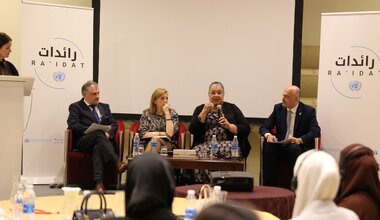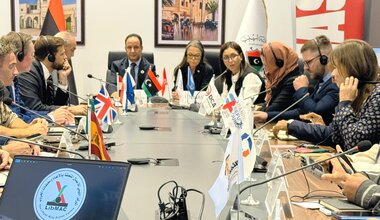Statement on International Human Rights Day by Co-Chairs (Netherlands, Switzerland and UNSMIL) of International Humanitarian Law and Human Rights Working Group of International Follow-up Committee on Libya
‘Free and Safe Participation of Libyans in Public Life Is Essential for Success of the Political Process’
10 December 2021 - On International Human Rights Day, the co-chairs of the Working Group on International Humanitarian Law and Human Rights under the Berlin process – the Netherlands, Switzerland, and UNSMIL – called on Libyan authorities to ensure that all Libyans can meaningfully participate in building the country’s future.
“As Libya prepares to hold elections and launch a national reconciliation process, protecting Libyans’ rights to free expression and peaceful assembly, as well as other fundamental human rights, is an essential foundation to realizing a more prosperous and peaceful country”, the Netherlands, Switzerland, and UNSMIL said. “After 10 years of conflict, decisive action is needed to ensure that all Libyans may benefit from the opportunity this critical juncture creates.”
In the year since a ceasefire was agreed and a political roadmap adopted, there have been significant security improvements. In line with the Libyan Political Dialogue Forum roadmap and UN Security Council resolutions, preparations for presidential and parliamentary elections are moving forward. Libyan leaders have taken steps towards a process of national reconciliation and transitional justice, with international support.
“Across the world, civil society organisations perform crucial functions to ensure the credibility and local ownership of peace processes, the fairness of elections, and the enactment of development initiatives free from discrimination,” the co-chairs stressed. “For current and future agreements in Libya to truly take hold, the country’s civil society must participate freely and safely.”
Libya has a long legacy of human rights violations and abuses against those who dare to speak out, as documented by UNSMIL, the Independent Fact-finding Mission on Libya, and other international and Libyan mechanisms. Politicians, human rights defenders, civil society activists, journalists, and others continue to be subject to targeted physical attacks, enforced disappearances, arbitrary arrests and detention, and prosecutions on spurious charges. Women leaders and activists face additional threats, intimidation, and harassment. Hate speech, including on social media, is an enduring problem.
Regulations adopted by Libyan authorities over the years have often resulted in severe restrictions on civic space. In particular, Decree 286, adopted in 2019, raises concern over the possible infringement of civic freedoms and the ability of organisations to operate without prejudice. Ahead of elections, civil society organisations were reportedly required to renew their registration with the Civil Society Commission in order to be accredited with the High National Election Commission (HNEC) as election observers. Such registration requirements have been shown to create new and undue obstacles to civil society operations.
While noting the right of all governments to regulate civil society organisations within their territories, Libya’s international legal commitments require the adoption of a legal framework for civil society that does not infringe on human rights and fundamental freedoms.
Of particular concern, a new regulation on association in Libya was proposed by the Government of National Unity in July 2021 that would impose restrictive registration requirements and other obstacles for civil society groups. Human rights groups have expressed serious reservations that the proposed regulation would contravene the 2011 Constitutional Declaration and the International Covenant on Civil and Political Rights, to which Libya is State party. In October, 16 Libyan organisations and four Libyan public figures proposed a text for a new draft law on regulating civil society that could usefully serve to enhance civic space, rather than restrict it.
“Libyans deserve to have their voices heard, free from intimidation and fear,” the Working Group co-chairs said. “To set a just basis for the future, we call on Libyan authorities to protect civil society, enact appropriate legislation that respects the rights of all Libyans to participate in public life, and ensure accountability when these rights are violated. As co-chairs of the Berlin process Working Group, we stand ready to support the authorities to fulfil these goals.”
The Working Group on International Humanitarian Law and Human Rights, in accordance with its mandate under the Berlin process and in cooperation with Libyan authorities, will continue to draw attention to specific human rights concerns in furtherance of the political process in Libya. This month, the Working Group is planning to facilitate inclusive dialogues among civil society and key stakeholders, the outcomes of which will be shared with Libyan policy-makers and Berlin process members.
 United Nations Peacekeeping
United Nations Peacekeeping UN
UN









